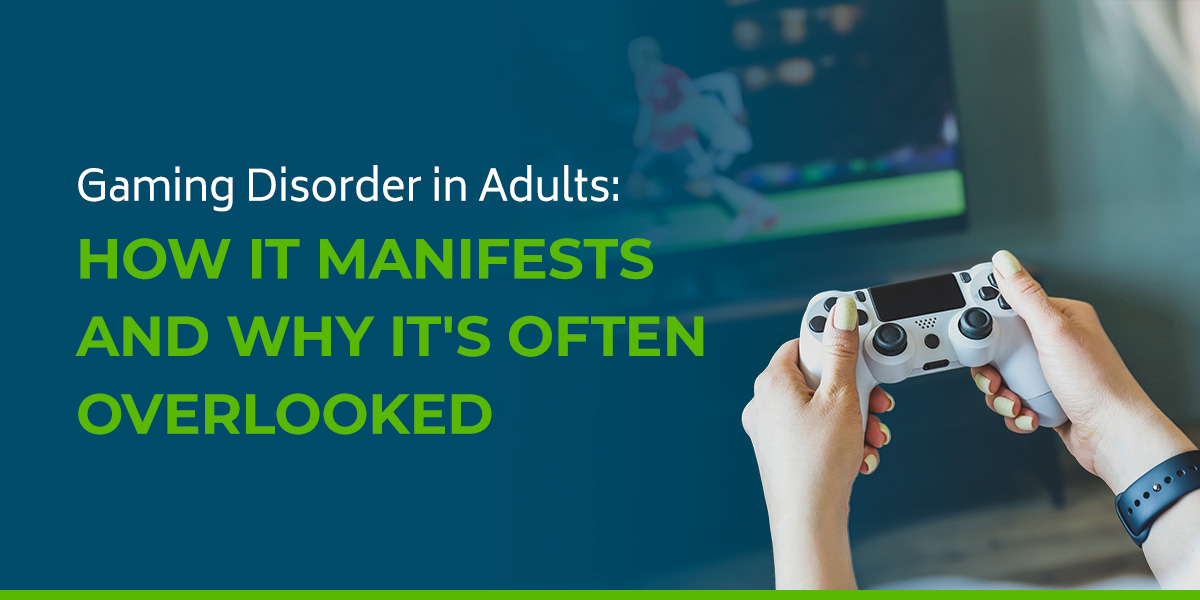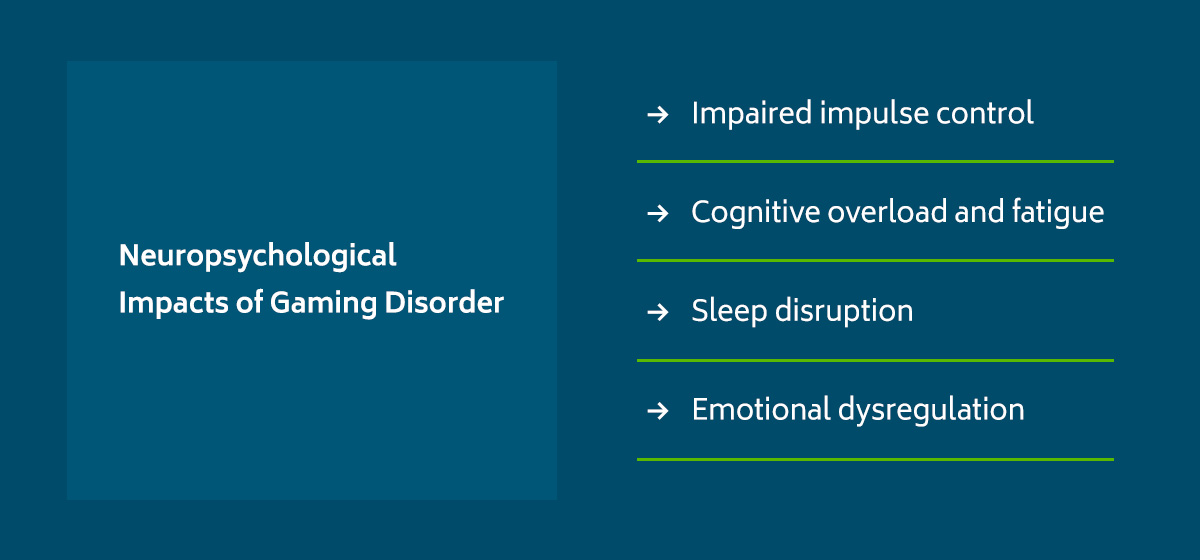
Gaming Addiction in Adults: How It Manifests and Why It's Often Overlooked
While video gaming can be a fun activity for most people, for some, it can become an all-consuming hobby that interferes with everyday life. Gaming disorder occurs when the activity becomes so compulsive that it interferes with responsibilities, relationships and a person's overall well-being. Below, we explore gaming addiction in adults and discuss how it manifests and why it's often overlooked.
What Is Gaming Disorder?
Gaming disorder involves addictive gaming behavior that affects an individual's everyday life. For example, an employee might neglect work assignments and miss deadlines because of late-night gaming sessions. They may also argue with family over their gaming time and feel irritated when they must reduce gaming time or stop gaming altogether.
The American Psychiatric Association's Diagnostic and Statistical Manual of Mental Disorders (DSM-5-TR) describes addiction to gaming as Internet Gaming Disorder (IGD). According to the DSM-5, an Internet Gaming Disorder diagnosis requires an individual to experience five or more specific symptoms within a year. Here's a closer look at the criteria for gaming disorder:
- Preoccupation with gaming: Constantly thinking about gaming, even while not playing.
- Gaming withdrawal symptoms: Experiencing sadness, anxiety or irritability when gaming is reduced or stopped.
- Tolerance: Needing to spend more time gaming to feel satisfied.
- Unsuccessful attempts to control gaming: Repeatedly failing to reduce or stop gaming.
- Loss of interest in other activities: Avoiding social events or other hobbies in favor of gaming.
- Continued gaming despite challenges: Playing even when aware of its negative impact on life.
- Deceiving others about gaming habits: Lying to friends and family about the time spent gaming.
- Using gaming to escape or relieve negative moods: Turning to gaming to manage guilt, sadness, stress or other negative moods.
- Jeopardizing relationship, education or career: Allowing gaming to interfere with key responsibilities or important relationships.
Gaming Disorder vs. Recreational Gaming
To distinguish between gaming disorder and recreational gaming, we have to look at the impact that the activity has on a person's life.
Recreational gamers can integrate gaming into their lives without sacrificing responsibilities or relationships. For them, gaming is for relaxation, socialization or entertainment. In addition, recreational gamers can set limits and stop playing when needed.
Internet gaming disorder causes significant harm to an individual's personal, social and professional life. The person may think about gaming constantly, even during essential tasks or conversations. In addition, they may struggle to limit gaming time, often playing for hours despite intending to stop.
Why Gaming Addiction in Adults Is Often Overlooked
Gaming addiction in adults is often overlooked for several reasons:
- Misconceptions about adult gaming: Adults struggling with Internet Gaming Disorder may face stigma, as society often expects them to "outgrow" gaming. As a result, they may hesitate to seek help. People around them may also dismiss their struggles as a lack of discipline rather than a mental health concern.
- Cultural normalization of excessive gaming: In some cases, gaming is considered harmless. This normalization can obscure when gaming habits cross the line into Internet Gaming Disorder.
- Lack of awareness among mental health professionals: Internet Gaming Disorder is still a relatively new condition, and many therapists may lack the training to recognize or treat it.
Signs of a Gaming Addiction
Recognizing and understanding the following signs can help you identify Internet Gaming Disorder in clients.
Gaming Disorder Behavioral Patterns in Adults
An adult who has a gaming disorder will:
- View gaming as a priority.
- Use gaming to help escape or relieve stress.
- Neglect everyday life responsibilities in favor of gaming.
- Socially withdraw in favor of gaming.
- Deceive others about the amount of time they spend gaming.
Clinicians may want to utilize some of the available screening and assessment tools for gaming disorders:
- Gaming Disorder Symptom Questionnaire (GDSQ): a screening tool for ICD-11 Gaming Disorder in Adolescents
- The Gaming Disorder Identification Test (GADIT) - a screening tool for gaming disorder basedon IDCD-11
- The Internet Gaming Disorder Test (IGD-20 Test) (Pontes et al., 2014)
Neuropsychological Impacts of Internet Gaming Disorder
Internet Gaming Disorder can have multiple neuropsychological impacts on an individual, such as:
- Impaired impulse control: Chronic gaming can increase impulsivity and make it challenging to manage time and prioritize tasks.
- Cognitive overload and fatigue: Prolonged gaming demands focus and quick reflexes, which can strain cognitive abilities over time.
- Sleep disruption: Irregular gaming schedules can disrupt an individual's circadian rhythm. Sleep deprivation can contribute to mood swings, reduced productivity and impaired cognitive functioning.
- Emotional dysregulation: Internet Gaming Disorder can increase anxiety and irritability when an individual's gaming is interrupted or restricted. This can lead to strained professional or personal relationships.

Treating Gaming Addiction
Internet Gaming Disorder treatment involves a combination of evidence-based therapies and practical strategies.
Cognitive Behavioral Therapy for Gaming Disorder
Cognitive behavioral therapy (CBT) focuses on identifying and altering the thoughts, emotions and behaviors that contribute to addictive gaming. Clinicians need to:
- Help the client identify triggers that drive them to game excessively.
- Help individuals replace gaming with healthier activities like exercise or creative hobbies.
- Guide clients to set boundaries, such as limiting gaming to specific hours or days.
Mindfulness and Stress Management Techniques
Many individuals with Internet Gaming Disorder may use the activity to escape stressful or difficult situations. Mindfulness-based techniques can help them develop healthier ways to manage their feelings and reduce anxiety. Techniques can include:
- Breathing exercises to reduce stress and bring attention back to the present moment.
- Mindfulness meditation to observe thoughts and emotions without judgment.
- Guiding clients to learn to label their emotions — such as, "I feel overwhelmed" — and explore healthier responses like journaling or talking to a friend.
Digital Detox Strategies
A digital detox can help clients break the habit of excess gaming and reset their relationship with technology. This can include:
- Setting clear boundaries on specific times or situations where gaming is not allowed.
- Removing gaming equipment from easily accessible areas.
- Using apps that monitor and limit gaming time so the client can stay accountable.
Barriers to Gaming Addiction Treatment
Gaming disorder clinical interventions can be challenging for a couple of reasons.
1. Underdiagnosis in Behavioral Health
Gaming disorder remains underdiagnosed for various reasons, including:
- Lack of awareness among professionals.
- Potential overlap with conditions like anxiety or depression overshadowing problematic gaming behavior.
- Unfamiliarity among clinicians regarding gaming culture — clinicians may struggle to differentiate between healthy and harmful gaming behavior.
Adequate training can help professionals address Internet Gaming Disorder. In addition, digital tools can help clinicians gather objective data about their clients' gaming behaviors.
2. Stigma in Gaming Disorder
Many adults, especially adult men, may feel ashamed about struggling with addictive gaming. Societal perceptions of gaming as childish may prevent them from seeking help. The rise of competitive gaming and streaming has also blurred the lines between intensive engagement and problematic behavior.
Public awareness campaigns that highlight real stories of recovery and peer-led support groups can give individuals and their loved ones the support they need. In addition, reframing therapy as an opportunity to improve balance and overall quality of life rather than a restriction on gaming may help.
Why Trust ICANotes?
Since Internet Gaming Disorder is a relatively new diagnosis, treating it effectively presents significant challenges. With a thorough treatment plan, you can help your clients start their journey to recovery and get their lives back on track. An essential component of creating effective treatment plans is creating thorough notes.
ICANotes is a trusted partner to mental health professionals. We help behavioral health clinicians like you create accurate and secure notes. Our electronic health record (EHR) software was designed by fellow mental health professionals and offers a comprehensive solution for documenting and tracking progress.
With ICANotes, you're not just using software. You're supported by a team dedicated to improving patient outcomes. You can trust us to help you effectively treat gaming disorders with confidence and precision.

Get Your Free 30-Day Trial - no credit card required!
Enhance Your Documentation With ICANotes
By recognizing the unique challenges associated Internet Gaming Disorder, clinicians can help their clients regain control over their lives and establish healthier relationships with gaming.
If you're a mental health professional looking for an efficient way to document and manage client care, ICANotes provides comprehensive software to streamline your workflow. Start your free trial today and experience how ICANotes can simplify your practice and enhance your ability to provide top-quality care.
Sources:
- https://www.psychiatry.org/patients-families/internet-gaming
- https://www.icanotes.com/2022/08/09/dsm-5-tr-changes-2022/
- https://pmc.ncbi.nlm.nih.gov/articles/PMC10050812/
- https://www.nigms.nih.gov/education/fact-sheets/Pages/circadian-rhythms.aspx
- https://www.icanotes.com/2022/11/29/interventions-for-anxiety/
- https://www.apa.org/ptsd-guideline/patients-and-families/cognitive-behavioral
- https://newsinhealth.nih.gov/2021/06/mindfulness-your-health
- https://www.icanotes.com/2024/11/21/treating-co-occurring-disorders/


